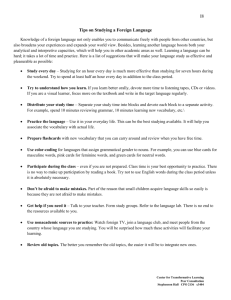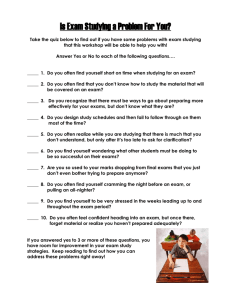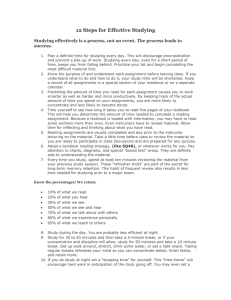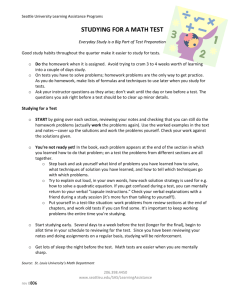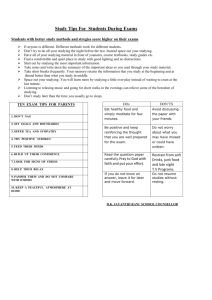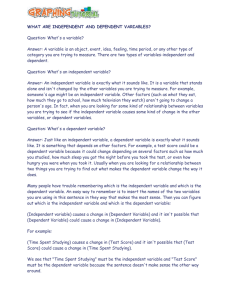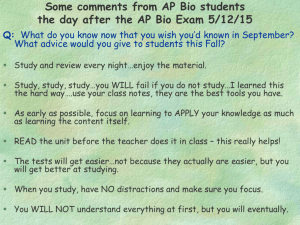U100 Learning to Learn #2 Strategies for Success in College
advertisement
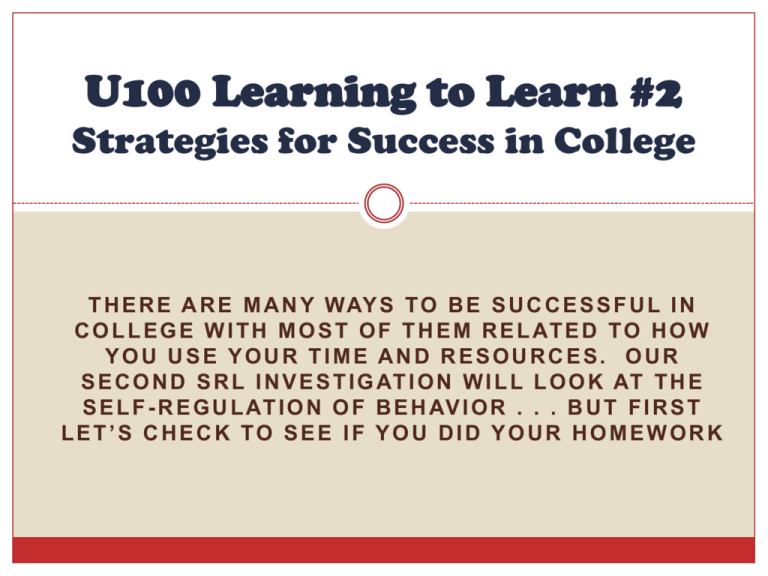
U100 Learning to Learn #2 Strategies for Success in College T H E R E A R E M A N Y WAY S T O B E S U C C E S S F U L I N C O L L E G E W I T H M O S T O F T H E M R E L AT E D T O H O W YOU USE YOUR TIME AND RESOURCES. OUR S E C O N D S R L I N V E S T I G AT I O N W I L L L O O K AT T H E S E L F - R E G U L AT I O N O F B E H AV I O R . . . B U T F I R S T LET’S CHECK TO SEE IF YOU DID YOUR HOMEWORK Learning in a Distracting Environment Get out 5 flash cards and have your partner help you memorize their flash cards. “Teach” your 5 concepts to your partner and have your partner “teach” their concepts to you. If you have difficulty with your flash cards, why do you think you would learn any better in front of the TV? Record: Listening & Taking Notes Daniel Mark is bored in his biology class. He has a hard time concentrating on the teacher’s lecture, the students in front of him are watching something on their laptop, he is lost when the teacher makes comparisons to the textbook, and when DM does pay attention he often disagrees with the teacher and then has a hard time listening to him. DM asks for your advice. What are his listening problems? On a piece of paper write down and turn in: Give Daniel Mark at least 3 suggestions based on Chapter 7 in your textbook. Bridges Chapter 7: Note Taking DM liked your advice and seems to have overcome boredom in lectures. He wants to do a better job taking notes in class to prepare him for the test in two weeks. Choose one of the 3 suggested approaches to taking better notes described in your textbook and write a brief explanation for how to use that method. Then describe in one or two sentences how to identify the key information in a lecture based on your reading in Ch 7. After writing out your ideas on paper, turn you paper in and then discuss your ideas in your group. Expert Students aren’t just “Smart” In high school most students believe the key to success is to be “smart.” Since very few high school students study a lot, most high school students assume the difference between students who get A’s and other students is students who get good grades are “smart.” But in college Expert Students are not just “smart,” they also follow the 3 Principles we discussed in the last class. Expert Students Take Responsibility Expert Students Change when necessary Expert Students Reflect on Success & Failure Step #1 Make a Plan & Regulate Your Behavior Many college students value being spontaneous – they want to take advantages of opportunities to have fun whenever it arrives … which is great. But if you don’t have a plan for how to use your time you will have to decide: Fun or School Planning your time and how you will use that time will give you the freedom to have fun when the opportunity arrives. You don’t have to sacrifice good grades for fun IF you plan your time. Taking Notes is SR of Behavior There are many types of expert students but they are all in control of certain behaviors that help them to succeed in most types of classes. Note Taking is one example of the Self Regulation of Behavior; there are many other behavioral resources to help you succeed. Self-Regulation of Behavior SR of Behavior is active control of resources including: 1. Time – Time management: When you study; Distributed practice 2. 3. 4. 5. 6. 7. Study Environment - Where; temperature, light, noise Peers - Who & When: alone, pairs, groups Faculty – Class questions, office hours, e-mail Textbooks – Reading, studying, SQ4R, X101 Notes – Note taking, class attention/involvement, engagement Extra Materials - Overheads, DVD, Practice tests, etc. Manage Minutes not Hours: Distributed Practice If you only had 60 minutes in one day to study for a vocabulary test, what would be the best way to memorize the words? What if you put the words on 3x5 cards and “studied” them for 10 minutes 6 times during the day? Distributing your studying to short sessions (between classes) allows you to review your learning and keep you brain “fresh.” When you take 10 minutes 4 – 5 times a day it saves time for having fun. High School vs. College: Changing Expectations High School College Traxoline Learning Real Understanding Short term learning Cumulative learning where superficial understanding “works” Skills are discrete not building on prior skills Cramming may have worked and led to good grades. expecting continued deep understanding Building skills over time (e.g. writing skills) Distributed practice is essential to build on prior learning Distributed practice makes learning easier for deeper understanding Self-Regulation of Behavior SR of Behavior is active control of resources including: 1. Time – Time management: When you study; Distributed practice 2. Study Environment - Where; temperature, light, noise 3. Peers - Who & When: alone, pairs, groups 4. Faculty – Class questions, office hours, e-mail 5. Textbooks – Reading, studying, SQ4R, X101 6. Notes – Note taking, class attention/involvement, engagement 7. Extra Materials - Overheads, DVD, Practice tests, etc. Multi-Tasking and Studying It only works for low-level processing Daniel Mark watches ESPN while he is studying. What is the impact on his learning? Chantelle says she studies best when she has her cell, computer, Facebook, iPod, and TV on so she doesn’t miss anything. What is the impact on her learning? What is the impact on college students of multi- tasking when studying? Self-Regulation of Behavior SR of Behavior is active control of resources including: 1. 2. Time – Time management: When you study; Distributed practice Study Environment - Where; temperature, light, noise 3. Peers - Who & When: alone, pairs, groups 4. 5. 6. 7. Faculty – Class questions, office hours, e-mail Textbooks – Reading, studying, SQ4R, X101 Notes – Note taking, class attention/involvement, engagement Extra Materials - Overheads, DVD, Practice tests, etc. Studying with your Friends When you were in high school you probably did some studying with your friends. What was the consequence? In your group discuss the advantages and disadvantages of studying with other students. When would it work and when wouldn’t it work? Studying with peers can help “finalize” your learning. Self-Regulation of Behavior SR of Behavior is active control of resources including: 1. 2. 3. 4. 5. Time – Time management: When you study; Distributed practice Study Environment - Where; temperature, light, noise Peers - Who & When: alone, pairs, groups Faculty – Class questions, office hours, e-mail Textbooks – Reading, studying, SQ4R, X101 6. Notes – Note taking, class attention/involvement, engagement 7. Extra Materials - Overheads, DVD, Practice tests, etc. Helping DM take notes in Lecture In your group discuss your suggestions for DM to help him take better notes in lecture. The Basics Teacher Clues Do your reading Repetition Bring materials Phrases (“3 factors...) Sit in front Postpone debate Participate in class Don’t judge teacher Relate class to you Board or Overhead Teacher Non-Verbals “This is important…” Teacher excitement Self-Regulation of Behavior SR of Behavior is active control of resources including: 1. 2. 3. 4. Time – Time management: When you study; Distributed practice Study Environment - Where; temperature, light, noise Peers - Who & When: alone, pairs, groups Faculty – Class questions, office hours, e-mail 5. Textbooks – Reading, studying, SQ4R, X101 6. 7. Notes – Note taking, class attention/involvement, engagement Extra Materials - Overheads, DVD, Practice tests, etc. Reading the Text & Taking Notes DM really wants to get a good grade in his communication class. What suggestions do you have for reading the textbook? L-Star System Outlining Technique Cornell (Modified Cornell, Split Page, of T System) Making mind maps (concept maps) Once again … distributed practice. Quick reviews of the text really help. Go over you outline, notes, concept maps before and/or after class as a review. It helps. Using SR of Behavior Requires Honest Reflection – Accepting you can’t really study in front of the TV. College requires deeper thought than HS Knowledge of Resources – What is available for your classes? Where is your instructors office? E-mail? Changing long-held habits. It used to work but not now. Self-Aware – Get your identity act together with clear academic goals. Think SMART goals: Process & Product Actively monitoring your behavior. Topic for Next Class Next class we are going to take the next step in SRL: Learning how our brain works and how we can take advantage of the strengths/weaknesses of our brain. Read Chapter 8 on Memory in Bridges pp. 192-229, the “Memory Jungle” handout in Oncourse, and if you really want to be prepared watch/listen to the ProfCast on Memory. Add to your flash cards so you have 10 important terms from SRL and 10 important terms from Chapter 3: Challenges to Communication. Make flashcards with YOUR definitions. Also put the 10 concept on your flashcards into a concept map (see p. 182-183 in Bridges for ideas about concept maps.)


